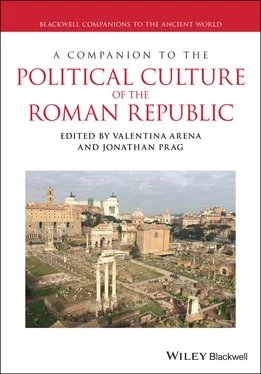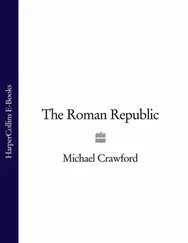By bringing together an analysis of the fundamental components of Roman political culture (ideas and values in Chapters 28and 30; civic and religious rituals in Chapters 1, 33and 34; myths, imaginary and space in Chapters 34and 35; communicative strategy in Chapter 32, the idea and practice of justice in Chapter 31and the role of violence and bribery in Chapter 29) with the study of institutions, including magistracies and priesthoods (Part III) and the investigation of the political actors in Roman Republican society (Part IV), we aim to provide the first integrated view of the political life of the Roman Republic, although without superimposing one uniform reading on the volume or on individual chapters.
For the first time, this volume gathers what is new in the study of Roman political culture in one place and includes studies of Roman Republican institutions analysed in their formal rules and prescriptions (Part III) and in their shared ritual practices, informing values, foundation myths and stories (Part V). Joined with considerations of the social dimension of this political system (Part IV), this approach sheds light on the cultural, ethical and symbolic network of opinions and beliefs, and integrates it with its institutional contexts and actions in specific historical contexts (Part VI). It follows that, to a certain extent, it is appropriate to say that one of the ambitions of the collection as a whole is to explore further the heuristic potential of the model that Martin Jehne (2005) has labelled Institutionalität . This approach moves away from an understanding of institutions as formalised structures and conceives them rather as patterns of social organisation, whose basic principles are provided with symbolic expressions and claims to validity that, in turn, are essential to their creation and preservation (Jehne 2006). Exploring a methodological avenue that has already borne interesting fruit in the study of Greek history (see, for example, the work by Matthew Simonton 2017 and Mirko Canevaro 2019), these chapters together explore the potential of ‘new institutionalism’ to provide a holistic view of the political world of the Roman Republic. We hope that the book goes some way to deepen and further nuance our understanding of the political life of Republican Rome and that it will provide a useful tool for students and scholars alike.
To this end, drawing together these hitherto disparate approaches and methodologies, we commissioned 40 chapters from scholars across the field, from various generations as well as different intellectual and academic traditions. They draw on the best scholarship of recent decades, adopting a variety of approaches, highlighting problems that remain open and contributing to set the agendas for future research to provide a new, updated and comprehensive view of the political world of Republican Rome. A very substantial amount of this work has been done in languages other than English by a wide range of international scholars and we have sought to make much of this available here in English, sometimes for the first time (and we are grateful to those who have undertaken the work of translation).
The resulting book is structured around three themes covered in Parts III, IV and V: respectively, Institutionalised Loci ; Political Actors; Values, Rituals and Discourse. Each of these parts encompasses a brief introduction, which delineates the contours of the scholarly debate and places the contributions onto that map. They are complemented by a section on the history of the interpretation of the political life of the Roman Republic, both in the early modern and modern period (Part I), as well as in ancient times (Part II), and by a section that includes five case studies (Part VI). A contribution by Karl-Joachim Hölkeskamp on the notion of political culture in the study of the political world of the Roman Republic ( Chapter 1) prefaces the whole discussion.
The section on the reception of this political system, which covers the ways in which Roman political culture has been reinterpreted both by contemporary as well as later interpreters, is based on the assumption that the shifting interpretations of this political system are an integral part of the task of the historian. The way in which interpreters engage with it becomes an intrinsic part of its nature (see Introduction to Part I). The book’s final section of five case studies (Part VI) examines five pivotal moments of the history of the Republic, ranging from the third century down to the first century BCE, where the dynamic interplay of institutional context, understood within the above meaning, shows different aspects of Roman political culture in action. Read in sequence, these case studies seem to us to offer a glimpse of the heuristic potential of current approaches to the political culture of the Republic and of the way that the transformation of the Republic is part and parcel of its political culture.
Geographically, the centre of our investigation is Rome and both its Italian neighbours and territories further afield are considered in relation to the focal point of power. Chronologically, the chapters cover approximately five centuries of Republican history, although there is inevitably a convergence towards the Middle and Late Republic, and those historical moments that are best attested in the ancient evidence. Most authors have used a diachronic approach; others, as per their remit, have focused on specific case studies, or have given closer attention to particular historical moments when the mechanisms of Roman political culture come more sharply into focus. The intention is to cover some of the main topics and show the directions in which current scholarship is now moving. The aim is not – and never could be – to be exhaustive, but rather to trace major lines of enquiry and highlight key ideas, frequently founded upon case studies and examples, and so to show the richness of Roman political life and of the scholarly approaches dedicated to its investigation. We hope thereby to contribute to the study of its centrality in the cultural world of later generations and of its contributions to our world.
Sadly, while this project was in its final stages, Fergus Millar, whose work and intellectual legacy punctuates each page of this volume, and Guido Clemente, who was also one of its contributors, passed away. Both were instrumental in our own intellectual formation and this volume is dedicated to their memory.
1 Canevaro, M. 2019. ‘Nomothesia e amministrazione finanziaria: frammenti epigrafici di “costituzionalizzazione” e sviluppo istituzionale nell’Atene di IV secolo.’ Historika 9: 485–524.
2 Jehne, M. 2005. ‘Die Volksversammlungen in Mommsens “Staatsrecht”, oder: Mommsen als Gesetzgeber.’ In Nippel, W. and Seidensticker, B., eds. Theodor Mommsens langer Schatten. Das römische Staatsrecht als bleibende Herausforderung für die Forschung. Hildesheim, 131–160.
3 Jehne, M. 2006. ‘Methods, Models, and Historiography.’ In Morstein-Marx, R. and Rosenstein, N., eds. A Companion to the Roman Republic (Blackwell Companions to the Ancient World). Oxford, 3–28.
4 Meier, C. 1980 [1966]. Res publica amissa: eine Studie zu Verfassung und Geschichte der späten römischen Republik. Frankfurt am Main.
5 Simonton, M. 2017. Classical Greek Oligarchy: A Political History. Princeton, NJ.
CHAPTER 1 Political Culture: Career of a Concept
Karl-J. Hölkeskamp
1.1 Inspiration(s) and Definition(s)
It was in 1989 that Josiah Ober used the concept of ‘political culture’ for the first time in a book on a classical subject, as far as I know, in his seminal work on the typology, status and functions of orators and oratory, and on the rhetoric of democracy in the political culture of fourth-century Athens. At about the same time, William Harris chose the same concept in his rejoinder to John North’s critical review of what the latter had labelled a ‘frozen-waste theory’ of politics in middle- and late-Republican Rome, 1in the style of Friedrich Münzer’s ‘aristocratic parties’ and their deliberately, if only thinly veiled arcana imperii , published in 1920. 2Above all, however, this label was meant to denounce Sir Ronald Syme’s concept of politics as a never-ending ‘strife for power, wealth and glory’, within the narrow and exclusive closed circles of ‘an aristocracy unique in duration and predominance’ as a ‘governing class’. This sombre vision of the decline and fall of the libera res publica was elegantly as well as magisterially expounded in his highly influential masterpiece The Roman Revolution , published in 1939 (see Chapter 7). Decades later, Syme still imperiously defended his radically elitist view as a kind of metahistorical eternal truth in his last book of 1986: ‘Oligarchy is imposed as the guiding theme, the link from age to age whatever be the form and name of government.’ 3The underlying concept of Republican politics was based on a set of interdependent assumptions: politics was conceived as a sort of zero-sum game between a relatively small number of dominant families, the aim of which was power in the shape of the consulship. In order to achieve this object of their ambitions, leading figures of these gentes formed alliances on the basis of kinship, dynastic marriages and other personal relationships. These long-term alliances were assumed to be very stable, they constantly rose to take over government when others fell from power, only to rise again after a generation or even later – this was the gist of politics. Other classes – the plebs as well as more affluent voters – ‘had no voice in government’ and even ‘no place in history’, but were (at best) ‘susceptible to auctoritas , taking their tone and tastes from above’. 4That was meant to imply that the whole populus Romanus was tied to these families by a pervasive network of steeply hierarchical links of patronage and clientship (see 29). Moreover, the system of group voting, particularly in the consular elections held in the equally hierarchical comitia centuriata , was supposed automatically to guarantee the overwhelming influence of the oligarchy as such on the outcome of these annual contests for the maximus honos (see Chapter 16). 5
Читать дальше












